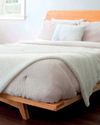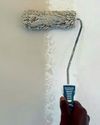
One thing to remember when using any type of electric sander is to keep it moving, leaving the sander in one place will 'over sand that place and make it stand out from the surrounding area.
When sanding, always change the sandpaper from coarse down through the grades to fine as you achieve the finish you require; don't expect one grade of sandpaper to do all the work.
There are three basic motions used in sanders;
• Orbital – the whole sanding plate moves in a small circle causing each grain of abrasive to move likewise.
• Belt - this gives sanding in one direction so any scratch marks will be along the direction of the belt.
• Rotary - - where the whole sanding disc goes round – the outer edge moves faster than the center so the surface is subjected to varying degrees of sanding.
Things to look for:
• Electric - either 220/230V or 110V - can use on-site where mains power or a 110V transformer is available.
• Cordless – ideal for using where mains supply is not available. Look for one with a Lithium-Ion battery as these last longer. Having a detachable battery is also useful, you can have a spare battery fully charged ready to insert when required rather than having to wait while a single battery is recharged.
• Dust bag - collects the dust as it is produced - generally not completely effective, you still end up with dust everywhere just less.
This story is from the March/April 2022 edition of The Home Handyman.
Start your 7-day Magzter GOLD free trial to access thousands of curated premium stories, and 9,000+ magazines and newspapers.
Already a subscriber ? Sign In
This story is from the March/April 2022 edition of The Home Handyman.
Start your 7-day Magzter GOLD free trial to access thousands of curated premium stories, and 9,000+ magazines and newspapers.
Already a subscriber? Sign In

SLEEP IN STYLE
This queen bed has a low profile yet it still has some unique design aspects. I used a hardwood and that made this project a little more difficult, but overall, I'm happy with how it turned out.

Paint roller tip for clean corners
When painting a room, I've found that wrapping a small sandwich bag around the roller's edge works wonders for clean corners.

Cable organiser using toilet paper rolls
Here's a clever little hack to keep your cables neat and tidy.

Metal cutting tools for home projects
I'm looking to get into metalworking and want to start with a few basic home projects, like making small furniture items and maybe even some sculptures.

Pleasurable plumbing
I just wanted to express my appreciation for your recent article on DIY plumbing fixes.

MAKE SOME NOISE!
Are you ready to embark on a musical adventure and create your very own drum kit from recycled materials? Get ready to unleash your creativity and make some noise with this fun and eco-friendly DIY project. Let’s dive into the step by-step guide and bring your mini band to life!

DIY HOME APPLIANCE REPAIR
From the whirring of the washing machine to the gentle hum of the refrigerator, our trusty home appliances keep our households running smoothly. But what happens when these essential gadgets start to falter?

EFFECTIVE METHODS FOR A PEST-FREE HOME
Pests, those unwelcome guests, can turn our homes into uncomfortable environments, disrupting our peace and posing health risks.

COMMON SEALANTS FOR DIY USE
By familiarising themselves with the diverse array of sealants available, mastering proper application techniques, and prioritising safety at every step, DIY'ers and homeowners in South Africa can tackle sealing projects with confidence and achieve lasting results that enhance the comfort, efficiency, and aesthetics of their homes.

UNLOCKING THE POWER OF ANGLE GRINDERS
In the world of DIY, few tools are as versatile and indispensable as the angle grinder. From cutting and grinding to polishing and sharpening, this powerhouse tool is a must have for any homeowner or DIY enthusiast.